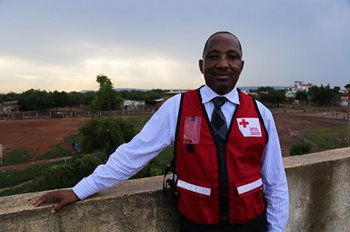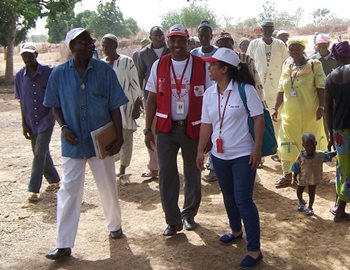Jules Zanré, a Montrealer originally from Burkina Faso, has spent the last 10 years improving access to health care for mothers, newborns, and children in many rural communities of Mali.
“When the 82-year-old village chief spoke, I saw that he was crying. I suggested that we take a break, but he wanted to tell us why he was so moved to have us in Dioni. He told us that before the Red Cross got involved, during each rainy season, he would bury at least one child under five every week because of malaria. Since the Red Cross project began and a community health worker has been in the village, child mortality has dropped so dramatically that half the cemetery had been used to grow crops that year.”
Encounters and stories like this are what have motivated Jules to dedicate nearly 10 years to Canadian Red Cross projects in Mali.
“We directly meet the needs of the public and get real results quickly,” he explains.
A life dedicated to teaching good health habits
A physician and public health specialist, Jules has worked for major international organizations (the World Health Organization, the United Nations High Commissioner for Refugees, the World University Service of Canada, and Action Against Hunger) to improve health conditions in his home country of Burkina Faso, as well as Mali, the Democratic Republic of Congo, and Burundi. Jules then wanted to join the Canadian Red Cross to participate in health and development projects that would allow him to see the concrete results of his efforts in communities.
Jules then wanted to join the Canadian Red Cross to participate in health and development projects that would allow him to see the concrete results of his efforts in communities.Since 2012, first as a health delegate and then as a Canadian Red Cross representative in Mali and the Democratic Republic of Congo, Jules has led two of the organization’s largest development projects in Mali: improving maternal, newborn, and child health (MNCH) by raising community awareness, and providing communities with much-needed equipment, medication, and training. Both projects were undertaken with the financial support of the Government of Canada provided through Global Affairs Canada.
He also coordinated two other projects for Red Cross Societies in Mali and the Democratic Republic of Congo to build emergency preparedness and response capacities.
“Alongside the Mali Red Cross and its vast volunteer network, the decentralized Ministry of Health services, and community organizations, we have succeeded in changing attitudes in 758 communities so that, when an emergency arises, the immediate response is to send the person right to the nearest health centre,” Jules says with pride.
“First, men had to be convinced to give some of their decision-making power to women, so that they could take the initiative to get themselves or their child to a health centre. Then, we encouraged communities to set up an emergency transportation system to quickly transport patients to these centres.”
“Lastly,” he continues, “the Red Cross provided equipment, medication and training to staff in 130 health care facilities and 441 community health workers across six project districts to provide effective care for mothers, children under five and newborns.”
After just two years, the results speak for themselves. Due to the greater empowerment of women and the more than 260 emergency transportation systems that communities have set up, 95% of emergency cases arrived at a health centre within an hour, resulting in real reductions in infant and maternal mortality in these regions.
A legacy of altruism
Jules’ desire to help people in need largely comes from his father, who was a positive force in their village in Burkina Faso. Jules was initially drawn to a career as a pilot but changed his mind.“I couldn’t study to be a pilot when most people in my village would only ever see a plane when it was flying high up in the sky,” he says. “It wouldn’t have done them any good at all!”
While studying health, he created the Health and Development Initiative, whose primary mission is to improve access to drinking water in Burkina Faso and therefore reduce disease and ease the burden on women. His children now help him promote the initiative and raise funds online while coming up with their own humanitarian projects.
“The torch has been passed!” Jules says proudly.
Jules’ other fight for gender equality and women’s empowerment
In addition to community health, Jules is also intensely aware of gender and women’s empowerment issues. Throughout his involvement in Mali, he and his team have worked to promote greater equity between men and women and to combat violence.
In Mali, domestic violence, female genital mutilation, and early marriage put the health of women and girls at risk. To raise community awareness about this reality, Jules’ team worked directly with community members.
 “We identified Gender Champions who naturally advocate against this violence and create a dialogue within the community,” he explains. In partnership with the other national Red Cross delegations on site and the Mali Red Cross, Jules also spearheaded a sexual abuse and exploitation prevention policy that gave many women a chance to speak out.
“We identified Gender Champions who naturally advocate against this violence and create a dialogue within the community,” he explains. In partnership with the other national Red Cross delegations on site and the Mali Red Cross, Jules also spearheaded a sexual abuse and exploitation prevention policy that gave many women a chance to speak out.Jules and the other Canadian Red Cross delegates also made sure to give women preference when recruiting community health workers for the project, particularly pregnant women and mothers of young children. In Jules’ mind, “It’s inexcusable today to discriminate against a woman because of her physiological state or family situation. We recruited these women and have made sure that they receive adequate support to complete their training and conduct their jobs. That’s what equity is all about!”
As a result of these efforts, 65% of the community health workers who have been recruited for the program are women. The program management team also had more than 50% female managers in leadership roles, some of whom were promoted from within.
Recognition for the Canadian Red Cross team involved in projects in Mali
Jules sees the 2021 Kroum Pindoff Award as recognition of a team effort. Firstly, that of the Canadian Red Cross in Mali, but also the Red Cross staff based in Ottawa who work on the Africa team, who contributed to the success of the projects Jules has led in recent years.On a more personal level, the award has only further strengthened Jules’ resolve.
“I get deeply invested in what I do, mainly defending women’s rights,” he says. “In my mind, [the award] means that it was the right thing to do, that I’m on the right track, and most of all, that I can do even better.”
Incidentally, the next project that Jules will coordinate will address the issue of early marriage and pregnancy.
Thanks to the tangible progress made by the projects that he recently led, and the relationships he built along the way, Jules was instrumental in securing funding from the Government of Canada for a new five-year project that focuses on adolescent sexual and reproductive health and rights in Mali. Approximately $15 million CAD will be invested to raise community awareness of this pervasive issue and keep young girls in school as long as possible to delay these milestones.

